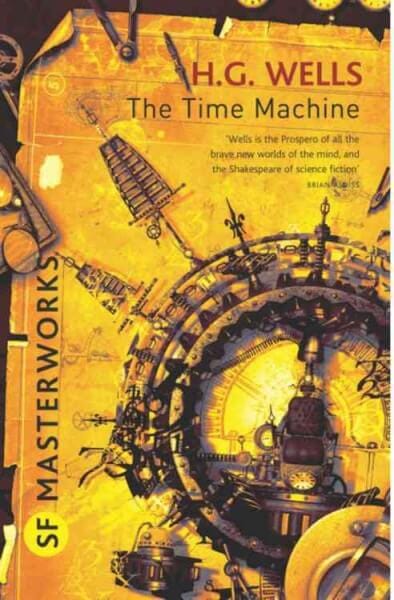When an author we’ve read is alive, we will send some questions their way. With our current theme of books, every author we’ll read is no longer living. And when this happens, we field questions to academics and experts.
Stephen Arata is Mayo Distinguished Teaching Professor and Professor of English at the University of Virginia. His books include Fictions of Loss in the Victorian Fin de Siècle and editions of William Morris’s News from Nowhere and George Gissing’s New Grub Street. He edited the Norton Critical Edition of The Time Machine, and was gracious enough to answer our questions
What was science fiction like before The Time Machine? What influenced that aspect for Wells?
Interestingly, the label 'science fiction' wasn't used until the early part of the 20th century. Together, Wells and Jules Verne pretty much invented the genre; what they were doing had no close models in previous fiction. At the time works like The Time Machine or The War of the Worlds or 20,000 Leagues Under the Sea were usually called 'romances,' not because they had anything to do with romantic love but because it was the standard term for stories that were not realistic.
There are examples from earlier in the 19th century of stories set far in the future: Mary Shelley's The Last Man, Edward Bulwer-Lytton's The Coming Race, and Richard Jefferies's After London are all set in post-apocalyptic worlds where the human race is either dying out or has evolved into something not-quite human. While Wells does something similar in The Time Machine, he adds the 'science' element—that is, his hero is able to visit the future because he's built that machine, whereas in the earlier books there's no technology or science. The idea that you could build a machine to travel through time was exciting and almost plausible; many readers thought it was just a matter of time (so to speak) before it became a reality. The excitement of scientific discovery is very much part of the appeal of Wells's novel. He was cagey, though: he never describes the time machine, which allowed readers to imagine it however they wanted. (If you watch the 1960s film starring Rod Taylor, it looks like a cross between a bicycle and a phone booth.)
The celebration of technology is one thing that separates Wells's books from two novels from earlier in the century that everyone now thinks of as a work of science fiction, Mary Shelley's Frankenstein and Robert Louis Stevenson's Dr. Jekyll and Mr. Hyde. In the movies, there's usually lots of zinging, banging, glowing machinery, but in the novel Dr. Frankenstein basically just sews together lots of body parts and in some unspecified way electrifies them into life. Dr. Jekyll concocts a formula that transforms him into Hyde—science, to be sure, but chemistry not engineering/technology.
Weena is the only named character in the book—why do we think this is? Is it symbolic?
A great question! I have no idea why she's the only named character or why he names her Weena. I could pretend I knew the answer, but I'd just be making it up. I'd be interested to hear what others have to say.
Did "time travel fiction" take off pretty quickly after this? Or did it take some time?
The Time Machine was not the prelude to a slew of time travel stories. (The War of the Worlds, on the other hand, did spark a number of tales having to do with alien invaders, while The Island of Doctor Moreau inspired others to write of the dangers of what we would now call genetic modification.) It's more accurate to put The Time Machine in the context of the Victorian attempts to come to terms with the discovery that geologic and galactic time stretched back eons further in the past than anyone had ever imagined, and conversely that, however many eons there were in Earth's future, that future was, in fact, finite. The sun would eventually explode and life on our planet would end. The time traveller of course has a vision of the end of things. Wells wrote journalism on a wide range of scientific topics, including evolution and species extinction. He also wrote on contemporary investigations in the nature of time itself, which include scientific speculation on the possibility of time travel.
You notice that the traveller only goes into the future. (Me, I'd turn the machine backwards in time.) Wells actually wrote a chapter, which he deleted from the final manuscript, in which the traveller returns to the the mid 17th century and the English civil wars. It's interesting to think about why the book in its final form is oriented solely towards the future.
What do we think Wells would make of 2023?
I think he would love watching the various Star Wars and Star Trek series. The latter especially would appeal to his fascination with techno-gizmos and to his hopes for human perfectibility. On the other hand, a part of Wells's character was deeply pessimistic. Most of his science fiction stories are cautionary tales about what will happen if we go down this or that path. I think he would be sounding the alarms about AI, for instance—while also writing movie screenplays to cash in on our culture's fascination with virtual intelligence and its capabilities. He was never too proud to make a buck.
And lastly, what were contemporary reactions to Well's "sociological" vision of the future?
His books were best-sellers from the 1890s through at least the 1920s, which suggests that people found his vision of the future compelling and, often, appealing. He always had detractors, though, who felt that the future he was imagining was finally too much like the world Terry Gilliam would (much later) depict in Brazil.
There you have it. Hope you enjoyed the answers. And we hope you’re reading something good!
See you next week,
E





